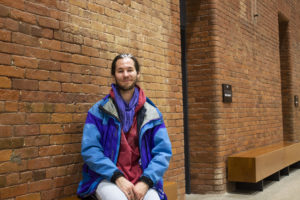‘Let the Hunger Games begin’ on LGBTQ2+ funding

Derrick (Deejah) Biso, 26, board member and volunteer with the Windsor-Essex Transgender and Allied Support Center and a group volunteer for the QT-Haus (Queer Trans Coffee Haus).
By Kamryn Cusumano
The Canadian government is allotting $20 million over two years to address the unique needs and disparities of the lesbian, gay, bisexual, transgender, queer and two-spirited community. However, advocates are looking critically at this initiative.
While they are pleased to see the government attempting to address LGBTQ2+ issues, they question whether the funding is really enough to make a difference.
“Any day that the government dedicates funds to advance the interests of Canada’s gender and sexual diverse communities is a good one,” said Jason Marin, executive director of
Windsor Pride. “That said, it’s hard for me to draw a connection between this funding announcement and its benefit for service providers like Windsor Pride Community.”
The budget document states the investment will be in capacity building and community-level work of Canadian LGBTQ2+ service organizations. Additionally, another $1.2 million will be allotted in 2020 to 2021 to continue the support and establishment of the LGBTQ2+ secretariat.
“In terms of helping organizations like Windsor Pride Community increase our ability and capacity to support the sexual and gender diverse communities that we serve, this funding doesn’t affect our day-to-day work,” said Marin. “Service providers are ineligible to receive funding from the Secretariat for programs and services.”
Marin said he welcomes and supports the government’s work in funding the Secretariat. He said what would really make a difference for Windsor Pride and other organizations across the country would be if the government earmarked some of this funding for service providers. According to Marin, that would allow programs and services like Windsor Pride to grow.
Jeremy Dias, founder and director of the Canadian Centre for Gender and Sexual
Diversity, said there are many unanswered questions and they, along with other agencies, will be looking at this very critically.
“Who is deciding what it is that we need,” said Dias. “How are funds going to be responding to the needs of folks in rural and remote communities? Will the army base be eligible to apply for funding and what is a service provider?”
Dias said there are a many agencies across Canada that expect to compete with for this funding that are not necessarily LGBTQ2+ exclusive groups.
“A lot of them run LGBTQ programs inside their doors,” said Dias. “So, are they eligible because they are an LGBT service agency?”
One thing Dias is concerned there will not be enough money to go around and this system creates unnecessary competition when applying for grants.
“Grants are taking 600+ agencies and they are telling them to fight, let the hunger games begin,” said Dias. “But all the kids want to make it until the end. Everyone wants to get to the cornucopia. Everyone wants to survive. Why are we treating not-for-profits with a for-profit lens?”
Since the announcement of the funding, Dias said his agency has been calling the minister for the Status of Women’s office and the executive director of the LGBTQ2+ Secretariat demanding changes to funding processes which he believes cause an unnecessary barrier to queer and trans organizations.
“Let’s prioritize organizations that have a board of directors that are LGBTQ identified,” said Dias. “Prioritize organizations who are part of the Service Providers Network or who are part of these agencies and who have legitimacy and […] the skills required so that they have the tools to make sure that they can follow through on the grant and that they have the support.”
Local advocates said they hope to see some of the funding go towards local LGBTQ2+ organizations and public education.
“$20 million advocated to grass roots community [work] would be where I hope it goes because that addresses the fact that we don’t have social spaces,” said Derrick (Deejah) Biso, 26.
Biso worked and volunteered for many of the local LGBTQ community agencies and is also a board member and volunteer with the Windsor-Essex Transgender and Allied Support Center and a group volunteer for the QT-Haus (Queer-Trans Coffee Haus).
“Children are not learning about how normal it means to be gay, queer and trans,” said Biso. “Instead they are growing up with prejudice and bigotry. We really need to normalize [LGBTQ2+ people] and make it every day and make it celebrated.”
Bronwen Wood, President of the South Windsor Soccer Club, said the government already funds LGBTQ2+ training for teachers but would like to see more education in diversity training for those who work with youth sports and organizations outside of education.
“That would hopefully give them tools to be respectful and treat people with dignity and even getting education about the Human Rights Code,” said Wood. “What are the rights of people, so clubs don’t accidently make mistakes.”
Wood has made “inclusion” their organization’s mandate with their new motto “soccer is for everyone.” She said many volunteers may not know the difference between gender expression and sexuality and hopes basic training would prepare these coaches for respecting the needs of LGBTQ2+ youth.
Wood said families may be more inclined and feel safer having their child participate knowing that the people working with their children understand their identities and needs.
“I think the level of tolerance, respect and exposure would just go up in the general public,” said Wood. “I’ve never known that to be a bad thing.”


